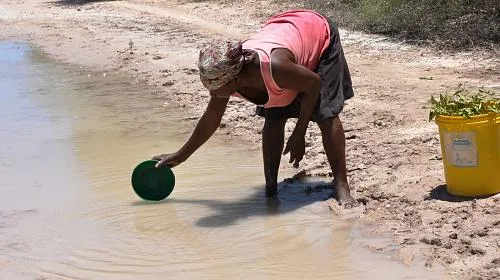MAPUTO, Mozambique (Jan. 28, 2016) — About 14 million people in Southern Africa are already facing hunger, and the situation is expected to deteriorate further as multiple countries in the region bear the impact of the El Niño weather system. In Mozambique, nearly 170,000 people are in need of immediate emergency relief, but the number could top 1.7 million people in the coming weeks.
“Families in drought-affected areas in southern Mozambique are rapidly running out of food, after the poor harvest of the previous year. And the situation will continue to worsen due to the poor rainfall during the current planting season,” said Marc Nosbach, CARE’s Country Director in Mozambique.
“CARE is especially concerned about the impact of the crisis on women and girls. During a recent visit to Inhambane province in Mozambique, we found women taking water from a puddle by the road, as the nearby borehole was no longer functioning. In another location a teacher explained that some children were no longer attending school as their families had moved to seek food and income in other areas. Increasingly families are skipping meals and eating wild fruits to get by,” said Nosbach.
CARE has started to provide emergency relief and recovery support such as drought-resistant seeds to families affected by the drought. As part of the COSACA consortium (consisting of CONCERN, Save the Children, Oxfam and CARE), CARE will be rehabilitating and installing new water points, while delivering food aid to 6,000 households and seeds and tools for up to 10,000 households in the Inhambane province.
“As a result of climate change, extreme weather events such as El Niño are having an even greater impact on poor and marginalized communities in Mozambique as their capacity to cope is being gradually eroded. Only providing emergency relief will not be enough,” said Nosbach.
In the last few years, CARE has helped vulnerable communities strengthen their resilience to crises through support for climate-smart agriculture, savings-and-loan groups and promoting women`s economic empowerment.
“Last year, we saw that the introduction of new agriculture methods helped farmers to protect their crops from excessive rainfalls, while savings and loans groups have helped people to cope for longer. However this year many households have depleted their resources and we are extremely worried that the growing scale of this emergency will go beyond available resources within the region,” said Nosbach.
The El Niño weather phenomenon this year is set to be the strongest on record, affecting rain patterns, temperatures and access to food in vulnerable communities across the world. CARE has so far provided food, water and other emergency relief to more than 600,000 people in six countries affected by El Niño.
-ENDS-
Media contact: Holly Frew hfrew@care.org +1.404.979.9389
About CARE: Founded in 1945, CARE is a leading humanitarian organization fighting global poverty. CARE has more than six decades of experience helping people prepare for disasters, providing lifesaving assistance when a crisis hits, and helping communities recover after the emergency has passed. CARE places special focus on women and children, who are often disproportionately affected by disasters. To learn more, visit www.care.org.

